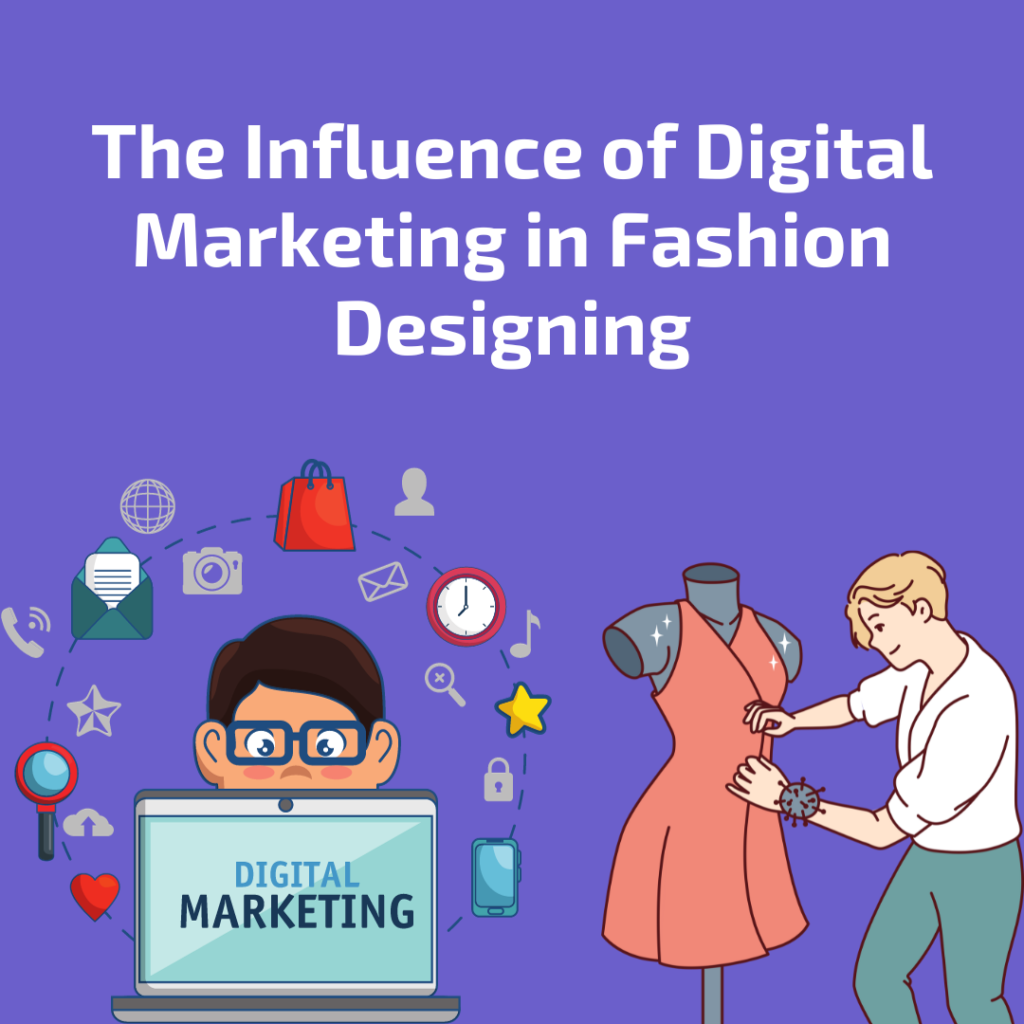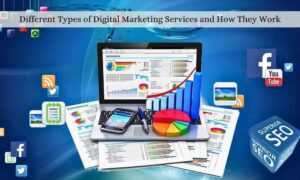Introduction:
The fashion industry has undergone a massive transformation in recent years with the advent of digital marketing. With the rise of social media and online shopping, fashion brands have had to adapt their marketing strategies to meet the needs of their customers in the digital age. We explore how digital marketing has impacted the fashion industry and why it is so important for fashion brands to embrace this new approach. The world of fashion has surfaced due to the preface of Digital selling together with branding and further and further use of technology bedded with the most recent fashion trends. Digital marketing can be defined as a form of direct marketing that connects buyers with merchandisers digitally through Interactive technologies similar to, emails, websites, and social networks. The fashion industry is witnessing numerous further changes as there’s further and further technology is being introduced and it has an impact on consumer adoption. Digital metamorphosis is how the process of imprinting fashion products is made easy. Fashion companies can use the vacuum of big data and analytics strategically to knit consumer experience and allow the client to lead the way.
Social Media
Fashion brands on social media: A modern platform for interaction between brand and customer. Digital marketing has made it easier than ever for fashion brands to reach a global audience. Through social media platforms such as Instagram and Facebook, brands can showcase their latest collections and engage with their customers in real time. This has led to increased brand awareness and a wider reach, which has translated into increased sales and profits. Before the inception of the internet, all the promotions and marketing for business were done through glossy magazines, TV, etc. Fast forward the years until now, a digital arena, we are seeing an online revolution in everything. And social media is ruling many facets of businesses and their impact on our lives is enormous. That is why incorporating social media strategies into the fashion industry has become a basic need for entrepreneurs of fashion brands and is like infusing the latest trends online on a global scale. It is a golden chunk of digital marketing and acts as a mediator between the brand and customers.
Benefits of Social media marketing to the Fashion industry Network
1. It reinforces brand awareness and credibility
2. It increases customer engagement and loyalty
3. Social networks impact buying decisions
4. Demographic targeting and retargeting
5. It maximizes conversion rates
6. It gives low to zero overhead cost
7. It is an effective marketing tool
Fashion Trends
Fashion trends refer to popular clothing and accessories worn at a particular time. It tends to be popular for a certain period. Among the fashion trends are large-size hats, bamboo bags, shell jewelry, and ornate belts. Digital trends, such as influencer marketing, have greatly impacted the fashion modeling landscape. Influencer marketing has given rise to a new type of model, the “social media model,” which has built a large following on platforms like Instagram, TikTok, and YouTube. These models can leverage their brand and large following to secure paid partnerships and collaborations with fashion brands and designers. This has led to a shift in the way fashion brands and designers discover and cast models, with a greater emphasis on social media presence and engagement. Additionally, the rise of e-commerce and online shopping has also had an impact on the fashion modeling landscape, as there is now a greater need for models who can effectively showcase clothing and accessories in digital formats.
EVOLVING TRENDS IN FASHION INDUSTRY
Digital Transformation: With the advent of technology, the fashion industry has witnessed a significant digital transformation. Online retail platforms, social media influencers, and digital marketing have become integral to the success of fashion brands.
E-Commerce
E-commerce has revolutionized the way we shop for fashion. With the rise of online shopping, fashion brands have had to adapt to meet the needs of their customers. Digital marketing has been crucial in driving e-commerce sales, and by creating a seamless shopping experience, they can drive more traffic to their online stores and convert visitors into customers. Fashion e-commerce is showcased by a range of characteristics. These include:
- Presentation – The design of any e-commerce website is its lifeblood. It not only has to be easy to read and use, but it also needs to stand out.
- Service that excels – Many of the best online retailers use promotions and customer service together. By intertwining
- them, it binds customers to the brand and creates long-lasting brand loyalty.
- Loyalty schemes – The clearest way to build brand loyalty. Reward customers who return again and again. Loyalty schemes are showcased across almost any ecommerce-based business.
- Alternative marketplaces – Whether this is via eBay, Facebook marketplace, Amazon, Bol, or elsewhere, the biggest brands tend to offer other ways to buy their products.
- Live chat – An easy way for customers with queries to get in touch.
- Automation – The entire process can be done without a conversation with another person. Just a few clicks and purchases are made.

Online Retail
Online fashion stores are websites or online platforms that specialize in selling clothing, accessories, and fashion-related items. These stores provide a convenient way for people to browse and purchase fashion products from the comfort of their homes or wherever they have internet access. The online fashion retail market in India size is estimated to grow by USD 22.97 billion from 2021 to 2026
.Global Reach: Online retailing allows fashion brands to reach a global audience, breaking geographical boundaries and expanding their customer base.
Convenience: Customers can shop anytime, anywhere, providing unparalleled convenience.
Social Media Engagement: Platforms like Instagram, Facebook, and Pinterest provide opportunities for fashion brands to engage with their audience through visually appealing content, influencer collaborations, and interactive campaigns. This flexibility caters to different time zones and busy lifestyles
Search Engine Optimization (SEO): Optimizing online content for search engines enhances visibility, making it easier for potential customers to discover fashion brands and products when conducting online searches
Mobile Optimization: With the majority of online shopping occurring on mobile devices, optimizing digital marketing efforts for mobile platforms ensures accessibility and a seamless experience for users on smartphones and tablets.
Influencers
Fashion influencers are people who have a large following on social media and use their platform to promote fashion brands and products. Additionally, influencer marketing has become vital to the fashion industry’s digital marketing strategy. Influencer marketing has been the most successful strategy for lifestyle and fashion brands. This marketing technique has benefitted both upcoming and established labels. Moreover, it has transformed the way consumers learn about new developments in this niche. Fashion influencers have now become an integral part of the social media marketing channel because they have carved a spot in the virtual lives of users. Fashion brands collaborate with social media influencers to promote their products and reach a wider audience. Influencers have a strong following on social media platforms, and their endorsement of a product can lead to increased brand awareness and sales. This has led to the rise of influencer marketing agencies and platforms that connect brands with influencers. Fashion brands using influencers will eventually know what their audience wants
Consumer Behaviour
In today’s fast-paced digital age, online shopping has become an integral part of our lives, revolutionizing how we consume products and services. One of the key benefits of digital marketing for fashion brands is the ability to personalize their marketing messages. With the help of data analytics and artificial intelligence, they can collect and analyze data on their customers’ browsing and purchase behavior. This allows them to tailor their marketing messages to individual customers based on their preferences, buying habits, and demographics. This personalised approach not only enhances the customer experience but also helps to build brand loyalty Brands can now access a wealth of data on their customers’ behaviour. Through data analytics, they can gain valuable insights into their customers’ preferences, buying habits, and demographics. This allows them to make informed decisions about their marketing strategy and tailor their messages to specific customer segments. Marketing plays a crucial role in shaping consumer buying behavior and influencing their shopping decisions. By understanding pricing psychology and tailoring marketing messages accordingly, businesses can effectively reach their target audiences and drive sales.
Conclusion:
In conclusion, digital marketing has had a profound impact on the fashion industry. It has changed how brands market their products and engage with their customers. Those who embrace digital marketing will have a better chance of success in the ever-evolving fashion industry. By partnering with a reputable agency like our team at Emotional Design Group, businesses can access a wide range of services and expertise, focusing on what they do best: running their business
If you are interested in learning Digital Marketing, then Moving Digits is your one stop destination
This blog is written by Saloni Patil









